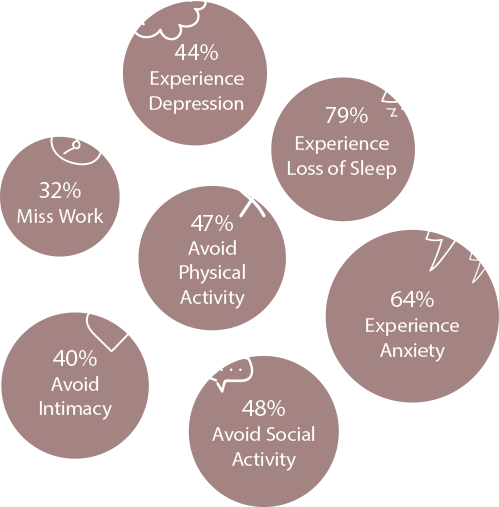
Dr. Sam Hanna
Dermatologist & Medical Director, Dermatology on Bloor
Summer’s a happy occasion for many Canadians, but for those living with atopic dermatitis — it can be a challenging time. Warmer temperatures and sweating can worsen symptoms, like skin dryness, redness, burning, and itchiness.
“The season isn’t joyful like it is for others,” says Dr. Sam Hanna, a dermatologist and Medical Director of Dermatology on Bloor in Toronto. “Their skin condition doesn’t always improve.”
There’s also a psychological price with the warmer weather. Eczema sufferers are often embarrassed about putting on bathing suits, shorts, and T-shirts, lest they expose scars or dark patches on their skin. “The impact is profound,” notes Dr. Hanna.
[Eczema sufferers] talk about how others hesitate to shake their hands or how a cashier cringed when taking their money.
Dr. Sam Hanna, Dermatology on Bloor
Living with a chronic skin disease
The disease, which affects 3%–5% of the population, has an added social stigma that makes coping even more difficult. “I hear patients say that people don’t understand what they’re dealing with,” Dr. Hanna explains. “They talk about how others hesitate to shake their hands or how a cashier cringed when taking their money.”
Many patients with moderate to severe atopic dermatitis use topical and oral steroids, or light therapy requiring three sessions a week. “There was an unmet need for this patient population,” says Dr. Hanna. “Some felt their condition was bad, but not bad enough to consider immune-suppressing treatments.”
The introduction of new biologic medicines to the market is offering hope. They work on the immune system by blocking the action of certain proteins to reduce itching and improve the condition of the skin. “It’s a more targeted approach that can lead to huge changes in patients who have lived with atopic dermatitis for decades,” Dr. Hanna explains. “For the first time in years, they’re able to sleep and experience less itching.”
Dr. Hanna points out that patients don’t have to put up with atopic dermatitis. He encourages those with the condition to be assessed by a dermatologist or allergist and to talk about possible treatment options. “Advocate for yourself,” he adds, “you deserve it.”
This article was made possible with support from a Canadian research-based pharmaceutical company.

Intense Itch. Burning. Pain.
The physical symptoms of atopic dermatitis have significant impacts on quality of life for those suffering with the condition.
Eczema Society of Canada under took a quality of life project to better understand the burden of living with atopic dermatitis (commonly called eczema). Survey respondents with moderate-to-severe atopic dermatitis identified the quality of life impacts seen to the right.
What is atopic dermatitis?
Atopic Dermatitis (Eczema) is a chronic inflammatory skin condition characterized by dry, itchy skin, with rashes that can be red, cracked, and even ooze and bleed. Atopic dermatitis can vary significantly in severity from patient to patient.
To learn more about atopic dermatitis and managing your condition speak with your health care provider. Eczema Society of Canada offers support and resources at eczemahelp.ca
All Information in this infographic was obtained from a 2016/2017 Quality of Life Report produced by the Eczema Society of Canada.


